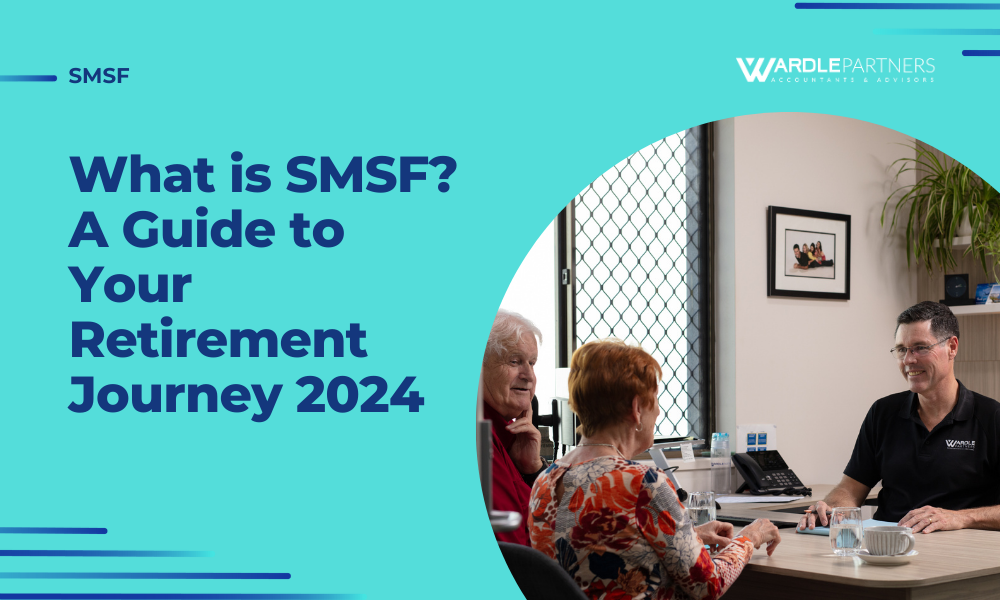Want Control Over Your Future? Discover What is SMSF

Feeling anxious at having more free time but less money to spend? Self Managed Super Fund (SMSF) and the SMSF Accountants’ guide, managing your retirement savings can be simple and straightforward. With the ability to make investment decisions, control administrative costs, and plan for your financial future, it offers unique opportunities and responsibilities. Discover the compelling advantages of partnering with experienced SMSF accountants to guide you on this journey.
What is SMSF?
At its core, a SMSF is a unique trust regulated by the Australian Tax Office (ATO) under the Superannuation Industry (Supervision) Act 1993 (SISA). Unlike traditional super funds, a SMSF is a private superannuation fund run for the Sole Purpose of providing retirement benefits to its members, with unique features that set it apart from other regular retail/industry super funds.
A SMSF can have up to six members, all of whom must be trustees, or in the case of a corporate trustee, all members must be directors. This ensures complete control over the smsf Investment Strategy and compliance ensuring your financial goals remain at the forefront.
What are the benefits of SMSF?
There are several benefits of an SMSF and as a trustee, you have control over how your super resources are invested and managed:
Control
Members have direct control over investment decisions tailored to their specific financial goals.
Flexibility
One of the standout benefits of SMSFs is the flexibility it offers. SMSFs offer a wide variety of investment options, allowing for a personalised investment strategy. SMSF accountants can work closely with you to craft an investment strategy that aligns with your unique financial objectives.
Tax efficiency
With careful planning, an SMSF can be an efficient structure for tax purposes, enabling strategies to minimise tax liabilities. Experienced SMSF accountants can even guide you in making the most tax-effective decisions for your SMSF.
Transparency
Members have a clear view of where and how their money is invested and can directly manage those investments.
Cost efficiency
Depending on the fund size and investment choices, an SMSF can be a cost-effective way to manage retirement savings.
Estate planning
SMSFs offer flexibility in estate planning, ensuring that the member’s wishes are carried out in the event of their death. Reaching out to experienced SMSF accountants can help you structure your SMSF to efficiently pass on wealth to beneficiaries.
Ability to borrow
Whilst a SMSF is generally prohibited from borrowing, there is an exception throw the use of an associated bare trust. Such borrowings add a lot more risk and complexity to the operation of the SMSF and are generally more expensive than traditional lending arrangements outside of superannuation. It is highly recommended Professional Assistance is obtained before embarking on this benefit.
What are some SMSF investment options?

SMSFs offer a broad range of investment options, allowing members to diversify and tailor their Investment Strategy. Options include:
- Shares: Dive into domestic and international stocks. Our SMSF accountants can guide you in selecting the right shares that align with your risk profile.
- Property: Explore residential and commercial real estate opportunities. Evaluate potential properties and manage the complexities of property investments.
- Bonds: Safeguard your portfolio with corporate and government bonds.
- Cash and Term Deposits: Balance risk with traditional low-risk assets. Our SMSF accountants will help you manage liquidity and optimise returns on cash investments.
- Managed Funds: SMSF accountants’ expertise with managed investment funds can select suitable managed funds that align with your investment goals.
- Collectibles: Such as art, antiques, and other valuables.
- Cryptocurrencies: Investment in digital currencies like Bitcoin. If you’re interested in cryptocurrency investments, we can help you navigate the regulatory landscape and assess the risks involved.
- Bullion: Investing in physical gold, silver, or other precious metals.
What are the risks and responsibilities of having an SMSF?
Running an SMSF requires significant time and skill. Compliance with laws and regulations is vital, and failure to comply can result in heavy penalties. Investment risks, administrative burdens, and costs should be carefully considered.
ATO has listed the key responsibilities of SMSF trustees.
What do I need to know in setting up an SMSF?
Self managed super fund set up requires careful planning, selection of trustees, a trust deed, a tax file number, an Australian Business Number (ABN), and an election to become a regulated fund. SMSFs can have either Individual Trustees or a Corporate Trustee, depending on the preferences and needs of the members. Before Choosing Individual vs. Corporate Trustee, comprehensive details and the pros and cons of each are required before deciding. Obtaining Professional Assistance is recommended to navigate these requirements.
How does an SMSF work?
Managing an SMSF includes the Trustees documenting and executing an Investment Strategy and ensuring it is kept up to date, good record-keeping, adhering to restrictions, preparing annual financial statements, tax returns and having the operations and financial reports audited. Professional assistance by SMSF accountants can take care of the annual obligations as well as help assist with smooth operation and compliance.
What is the purpose of SMSF?
Beware of people promoting the early release of super schemes. The Sole Purpose of an SMSF is for the trustees to manage the assets of the trust for the benefit of its members (beneficiaries) when they retire. Generally, it is illegal for anyone to benefit from the SMSF outside of this sole purpose. It can be illegal to:
- access funds early
- invest in a related business
- use the fund’s assets – for example, by holidaying in your SMSF’s investment property
- be paid for your duties or services as a trustee.
There may be people promoting illegal schemes offering to help you withdraw your super before retirement to use for paying off debts, buying personal assets, paying for a holiday, or other illegal activities. When it comes to eligibility for accessing and withdrawing superannuation, SMSFs are subject to the same strict rules as retail and industry superannuation funds, which generally require a condition of release to be met, such as retirement age or approval under special circumstances including:
- temporarily or permanently incapacitation
- having suffered severe financial hardship
- meeting conditions for compassionate grounds
- having a terminal medical condition
- taking part in the first home super saver scheme
Conclusion
An SMSF offers a personalised approach to retirement planning, with extensive control and flexibility. However, it also demands time, skill, and rigorous adherence to regulations.
As a CPA accounting firm in Caloundra QLD Australia, Wardle Partners Accountants & Advisors has been specialising in SMSF set-ups, administration, processing, compliance advice, accounting, taxation, and wind-ups for over 40 years. Please note that the above information is general in nature. For personalised advice tailored to your specific situation, we recommend consulting with one of our experienced SMSF accountants.
By providing this introduction to SMSFs, we hope to provide valuable insights for those considering this path for retirement planning. The linkages to other blogs within this series offer a more in-depth understanding of related topics, forming a comprehensive guide for SMSF management. If you have any questions or need professional assistance, feel free to contact us or schedule a free consultation with one of our SMSF experts.
With the expertise of Wardle Partners’ SMSF accountants, you can regain control of your investments, navigate complex compliance, and secure a better retirement journey.
Did you know?
According to the Australian Taxation Office, SMSF growth continues to soar. In the 5 years to 2021–22, the number of SMSFs grew by an annual average of 1.5%, with an average of 2,000 new funds established per month.
27,700 SMSFs were established in 2021-22, up from 20,000 in 2018–19.




